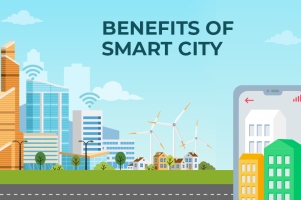Smart Cities
The concept of Smart Cities is a transformative urban development paradigm that integrates information, communication technologies, and various smart solutions. These cities focus on improving the quality of life for residents, enhancing sustainability, and optimizing resource management. To create more efficient and liveable urban spaces, smart city initiatives have gained prominence in recent years.
Enhanced Connectivity and Infrastructure
One of the significant advantages of smart cities is the revolutionized connectivity and infrastructure. With technology integration, these cities boast efficient transportation systems, streamlined traffic management, and enhanced accessibility.
Resource Management and Sustainability
Smart cities prioritize sustainability through efficient resource management. These initiatives focus on energy conservation, waste management solutions, and sustainable practices to reduce environmental impact.
Public Services and Governance
Smart cities significantly impact public services and governance, leading to improved healthcare facilities, enhanced public safety, and more efficient administration.
Economic Growth and Opportunities
Establishing smart cities cultivates economic growth, creating job opportunities, fostering businesses, and contributing to overall economic development.
Technology and Innovation
Smart cities leverage innovative technology such as the Internet of Things (IoT), data analytics, and artificial intelligence to enhance urban living standards.
Quality of Life and Livability
Smart cities enhance the quality of life by promoting better living standards, improved health and well-being, and offering diverse cultural and recreational facilities.
Challenges and Implementation
Despite their numerous benefits, smart city initiatives face challenges such as privacy concerns, infrastructure issues, and the necessity for effective implementation strategies.
Case Studies and Success Stories
Analyzing successful case studies demonstrates the real impact and effectiveness of smart city initiatives on urban communities.

Future Prospects and Conclusion
Looking ahead, the article wraps up by discussing the prospects and trends and summarizing the benefits of smart cities.
FAQs About Smart Cities
1. Q: What are Smart Cities?
A: Smart cities are urban areas that integrate technology and data-driven solutions to enhance efficiency, sustainability, and the overall quality of life for residents.
2. Q: What are the main benefits of Smart Cities?
A: Smart cities offer numerous advantages, including improved infrastructure, enhanced connectivity, efficient resource management, better public services, economic growth, and a higher quality of life.
3. Q: How do Smart Cities improve infrastructure?
A: Smart cities leverage technology to optimize transportation, streamline traffic management, and create more efficient and sustainable infrastructure for urban areas.
4. Q: What role does technology play in Smart Cities?
A: Technology such as the Internet of Things (IoT), data analytics, and artificial intelligence forms the backbone of smart cities, driving innovation and efficiency in various urban systems.
5. Q: How do Smart Cities impact the environment?
A: Smart cities focus on sustainability by promoting energy efficiency, smart waste management, and water conservation, thus reducing the environmental footprint of urban living.
6. Q: What challenges do Smart Cities face?
A: Challenges include privacy concerns, infrastructure issues, and the need for effective implementation strategies for smart city initiatives.
7. Q: How do Smart Cities improve quality of life?
A: They enhance the quality of life by offering improved healthcare facilities, ensuring public safety, and providing diverse cultural and recreational amenities.
8. Q: Do Smart Cities create job opportunities?
A: Yes, the development of smart cities fosters economic growth, creating job opportunities and stimulating business innovation within urban areas.
9. Q: What successful case studies exist in Smart City innovation?
A: Several cities globally, such as Barcelona, Singapore, and Amsterdam, have implemented successful smart city initiatives, showcasing the practical benefits of these innovations.
10. Q: What does the future hold for Smart Cities?
A: The future of smart cities involves continued advancements in technology, sustainable practices, and ongoing development, shaping urban landscapes for enhanced living experiences.

